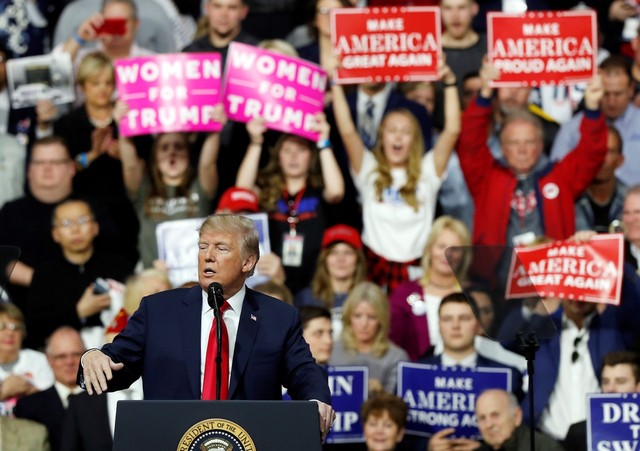Posted on : Mar.12,2018 17:19 KST
Modified on : Mar.12,2018 17:36 KST
 |
|
President Donald Trump speaks at a campaign rally for Rick Saccone, a Republican candidate in the 18th Congressional District, in Moon Township, Pennsylvania on Mar. 10. (EPA/Yonhap News)
|
After a series of inter-Korean and South Korean-US meetings last week, a first-ever summit between North Korea and the US is scheduled to take place in May following an April inter-Korean summit at Panmunjeom. All at once, astonishing and unprecedented developments are pushing the Korean Peninsula toward a major transition. Depending on how things progress at both summits, it’s within the realm of possibility that the discussions could move beyond the denuclearization agenda to establishing a peace regime on the Korean Peninsula. But a number of risk factors will have to be overcome for the North Korea-US summit to become a reality. Seoul will need to manage those lurking factors very carefully on the off chance that one or more might ruin this major opportunity.
Having returned from the US with this major achievement, the special envoy team is planning to embark on Mar. 12 on visits to China, Japan, and Russia to explain the talks’ outcome. On the surface, Beijing and Tokyo both welcome the agreement by Pyongyang and Washington; inwardly, things appear more complicated. Many in China, which was chair nation in the past for the Six-Party Talks to resolve the North Korean nuclear issue, are concerned that the lightning-speed development will diminish the country’s influence. Japan is worried about being shut out of the major agreement process between North Korea and the US. Seoul will have to work hard to explain the agreement terms in detail so the two countries do not feel left out of the developments, while seeking their cooperation and support as allied forces as the situation progresses.
Because the agreement to hold a North Korea-US summit was reached so suddenly between the two sides’ leaders, there was no time for the kind of tedious exploration and coordination process seen in the past. The conditions were not established to invoke a safeguard of mutual guarantees among the countries, as with the Six-Party Talks. But even if the summit between President Donald Trump and North Korean leader Kim Jong-un does actually happen, the support and guarantees of those countries will be essential for the denuclearization measures to be implemented and the issue of a Korean Peninsula regime to be eventually addressed. In that sense, Seoul needs to do more than just create the conditions for the immediate success of the North Korea-US summit. It will also need to manage things closely from a broader perspective that takes the future into account, allowing China, Japan, and Russia to serve as reinforcements for peace on the peninsula.
There also needs to be a close examination of the negative currents being expressed in and around Washington over the surprise agreement with Pyongyang. US President Donald Trump has been heating things up with his proclamations about achieving what his predecessors had failed to do over the past 30 years, or potentially making “the greatest deal for the world” at the summit. The rest of the administration, Congress, and the press, however, have expressed much more skepticism about whether Trump’s “high-risk gamble” will actually pay off. Judging from own personal temperament and his political need to turn his fortune around with a foreign policy achievement, Trump is very likely to brush these concerns aside and go ahead with the summit. But the summit’s prospects could worsen if the arguments against trusting Pyongyang gain traction. Reports have quoted officials as giving the summit less than 50 percent odds of actually happening. It’s a sign of how tough the situation is.
Seoul need to help put this skepticism in the US to rest by stressing the importance which the North Korea-US summit holds. As it happens, Minister of Foreign Affairs Kang Kyung-wha will be in the US this week to meet with Secretary of State Rex Tillerson, who is considered one of the leading negotiation proponents in the US administration. The best outcome would for them to gather the momentum to sweep aside the obstacles on their own. Seoul needs to use every available channel and all its capabilities to minimize the potential variables accompanying North Korea-US dialogue.
Please direct questions or comments to [english@hani.co.kr]






